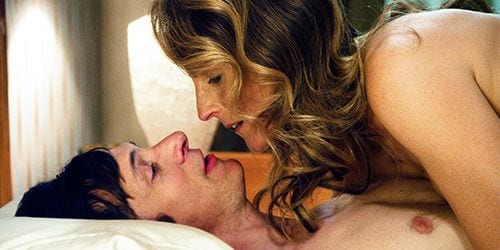
Among the many shocks to greet film fans on Oscar nominations’ morning, one of the biggest was the exclusion of The Sessions’ John Hawkes from the Best Actor race.
His especially Academy-friendly turn as a man in an iron lung seeking to have sex for the first time was seen as an early favorite to win, not just snag a nomination. Of course, he slid down at least one spot once everyone saw Daniel Day-Lewis absolutely own Abraham Lincoln. Yet he was still a virtual lock to be nominated.
Then he wasn’t.
The Sessions lost a ton of steam coming down the stretch, in part because of an over-aggressive release strategy that saw the festival smash expand quickly despite modest returns in limited release. By the end of its sixth weekend in theaters, it had peaked at the box office.
This forced a quick cut in total theaters to keep the film from hemorrhaging money. By the time other Oscar contenders like Les Miserables, Silver Linings Playbook, and Flight hit theaters and actually became hits, The Sessions had been completely forgotten.
Of course, a similar argument could be made regarding The Master and that didn’t keep Joaquin Phoenix from his third career nomination. Two differences: first, The Master has made more than three times what The Sessions has at the box office. $15 million still isn’t much, but it’s significantly more eyes than $5 million.
The Master also had a bevy of critical support that kept it in many “best of” conversations. The Sessions had a few fans, but it wasn’t consistently appearing on Top 10 lists. Subsequently, Phoenix remained on voters’ minds throughout December and early January, and—despite publicly saying he didn’t care about awards—earned himself a nomination.
I could break down how Denzel Washington stole the last Best Actor slot from Hawkes, but it’s a similar story. Flight made a ton of money and has a devout following (in the Academy, as well as a few critics). Instead of getting into how and why Hawkes deserved the recognition over his male peers, let’s compare his performance to that of his Sessions costar and Oscar nominee, Helen Hunt.
Hunt was also seen as a lock going into nominations day. She snagged nominations from the BAFTAs, BFCAAs, Golden Globes, Independent Spirit Awards, SAG, and a few critics associations. She was a sure thing, just as much as Hawkes if not more so, and she ended up getting the nod.
She shouldn’t have.
If you had to compare the two roles, picking a winner is appallingly obvious. Hawkes was required to limit his movements to such an uncomfortable degree it had to literally hurt to act every day. Despite this, he made Mark O’Brien incredibly empathetic without ever complaining about his affliction. He raised his eyebrows, strained his eyes, and created an appealing (and I imagine accurate) voice for the Boston-born, California-raised poet. While the role as written screamed “OSCAR”, Hawkes’ portrayal could not have been more earnest.
Hunt, on the other hand, delivered a performance wrought with issues, not the least of which was Oscar grandstanding. Nudity and accents are two of the Academy’s favorite elements to showcase, and Hunt’s role as a Bostonian sex surrogate called for both. While she handled the nudity just fine, she had what I can only describe as the worst Boston accent I’ve ever heard.
Her “r’s” were only changed to “ah’s” intermittently, and when she did remember to say “Mahk” instead of “Mark” she would forget to keep it going before she got to the end of her sentence. “Car” was sometimes “cah” and sometimes “car”, but “Mark” was always “MAHHHHK”, as if she was doing a skit on SNL.
You can call her courageous all you want for getting naked (and the Academy certainly loves to reward actors for doing so), but let’s be honest. She’s a beautiful woman. Not only is she naturally good looking, she had plenty of time to get into shape before the cameras started rolling. We’re not talking about a Robert De Niro in Raging Bull kind of transformation here. We’re just seeing another person willing to bare all for what she determined to be the “right reasons” (I’m assuming she liked the script and really liked a shot at Oscar #2).
In the end, you have to be intriguing when you’re fully clothed as well. Hunt was not. Hawkes was. If only the Academy could tell the difference.

![Call for Papers: All Things Reconsidered [MUSIC] May-August 2024](https://www.popmatters.com/wp-content/uploads/2024/04/all-things-reconsidered-call-music-may-2024-720x380.jpg)



